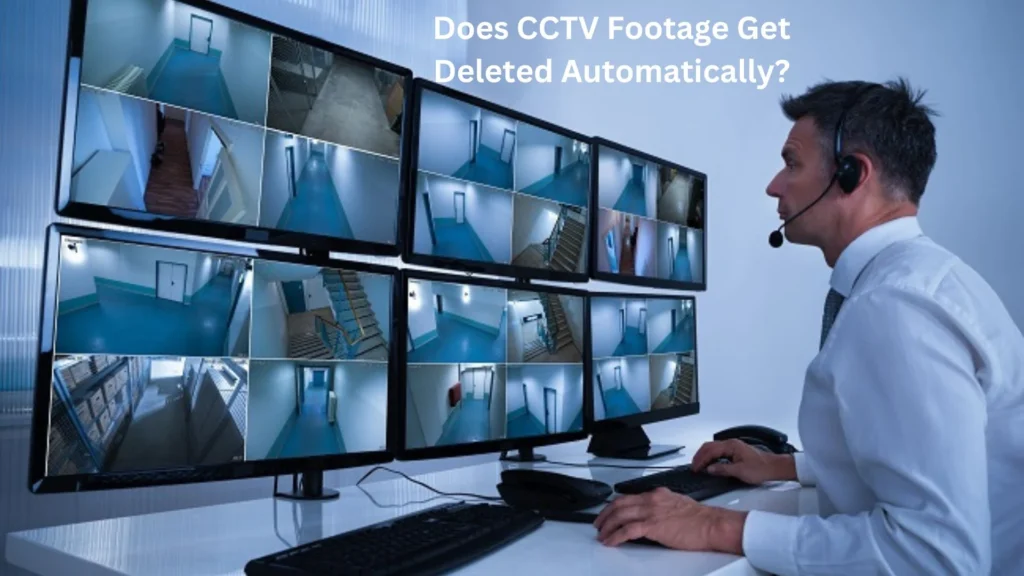In today’s world, closed-circuit television (CCTV) systems are everywhere, from homes and businesses to public places. One of the most frequently asked questions about CCTV systems is: does CCTV footage get deleted automatically?
This article explores the mechanisms behind CCTV footage storage, the factors that determine whether footage is automatically deleted, and how you can manage this system for optimal security.
Understanding CCTV Footage Management
1. What is CCTV Footage?
CCTV (Closed-Circuit Television) footage refers to video recordings captured by surveillance cameras. These recordings serve various purposes, including security monitoring, evidence collection, and incident analysis.
2. How CCTV Systems Work
CCTV systems typically consist of cameras, a recording device (DVR or NVR), and display monitors. The recording devices capture and store video footage from the cameras, which can then be accessed for review or playback.
Does CCTV Footage Get Deleted Automatically?
Yes, CCTV footage can get deleted automatically. Most systems overwrite older footage when storage fills up. This happens based on a set schedule, like every few days or weeks.
I recommend checking your system’s settings for specifics. If you need to keep footage longer, consider increasing storage or backing it up.

How Long CCTV Footage Is Typically Stored
The duration for which CCTV footage is stored varies greatly. In most cases, footage is kept for anywhere between 7 to 90 days.
Factors such as storage space, legal requirements, and system settings influence this time frame.
How Storage Space Affects Deletion
One of the primary reasons footage gets automatically deleted is a lack of storage space. Once the system’s capacity is reached, older footage is overwritten by new recordings.
The size of your hard drive or cloud space will directly impact how long you can retain video files.
Best Practices For CCTV Footage Management
1. Regularly Review and Backup Footage
To ensure critical footage is not lost, regularly review recordings and back up important data. Establish a routine for checking stored footage and identifying which videos should be archived.
2. Implement Clear Retention Policies
Set clear retention policies that comply with legal requirements and the needs of your organization. This will help manage storage effectively and avoid unintentional data loss.
3. Upgrade Storage Solutions When Necessary
If your CCTV system frequently runs out of storage, consider upgrading your storage capacity or investing in a system that allows for cloud backups. This can prevent the automatic deletion of important footage.
Can I Recover Deleted CCTV Footage?
Recovering deleted CCTV footage can be challenging, but it’s sometimes possible, especially if the footage hasn’t been overwritten. If you act quickly and use specialized recovery software or consult a professional data recovery service, there may be a chance to retrieve it.
Can Someone Delete CCTV Footage?
Yes, CCTV footage can be deleted by individuals with access to the recording system. This includes administrators or users with the right permissions, highlighting the importance of secure access controls to prevent unauthorized deletions.
Why is CCTV Deleted After 30 Days?
CCTV footage is often deleted after 30 days due to storage limitations and retention policies. Many systems use loop recording, meaning that when storage is full, the oldest footage is overwritten to make room for new recordings, balancing security needs with available storage space.
Conclusion
Understanding how CCTV footage is stored and deleted is crucial for ensuring the safety and security of your property.
By taking steps to manage your system’s storage capacity and implementing effective retention policies, you can avoid losing important footage when you need it most.
- How to Get Water Out of AirPods? Here’s Solution - November 21, 2024
- Are AirTags Worth It? – [Depends on You] - November 21, 2024
- How to Replace a Lost AirPod? - November 21, 2024
